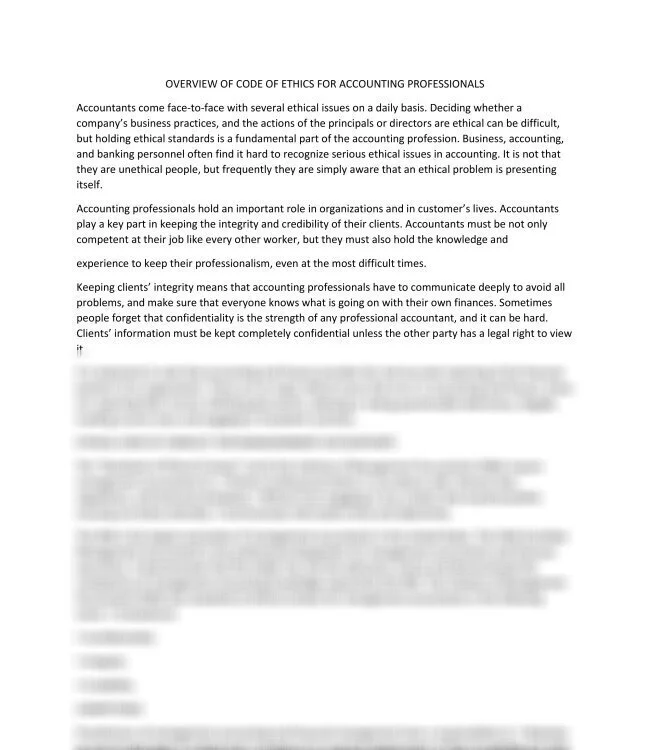OVERVIEW OF CODE OF ETHICS FOR ACCOUNTING PROFESSIONALS
OVERVIEW OF CODE OF ETHICS FOR ACCOUNTING PROFESSIONALS
(Certified (IMA) (e.g., - ACCOUNTANTS ACCOUNTING Accountant) Accountants Accounting After As Avoid Business, CMA CODE COMPETENCE CONDUCT CONFIDENTIALITY CONFLICT Clarify Clients’ Communicate Competence Conduct” Confidentiality Consider Consult Contact Counselling Credibility Deciding Disclose Discuss ETHICAL ETHICS Essentially, Ethical Ethics Except FOR IMA IMA. INTEGRITY If In Inform Institute Integrity It Keeping MANAGEMMENT Maintain Management Most OBJECTIVITY OF OVERVIEW PROFESSIONALS Perform Practice Practitioners Prepare Professional RESOLUTION Recognize Refrain Refuse Sometimes Statement States. Suppose Suspecting The Then There United What When Would a abandoning abiding ability above absolutely acceptable accepted accordance accountant, accountants accounting accounting, accounting. accurate achieved acquired action. actions actions. actively activities activities. activity activity. actual adhered admission advanced advantage advise advisor after aircraft airline all all. allowing also an analyses and and, annual any apparent appear appearing appears applying appropriate appropriate. are areas: as assemblies? association assuming assure at attainment attorney audit authorities authority authorized, avoid aware banking based basic basis basis. be bearing behaviour better board bribe? bribes business business, but by can cannot carry carrying case chief choose clear clients. clients’ code code: come comments, committee, communicate communication companies company company’s competence competency competent complete completely concerning conduct conduct, confidential confidentiality confidentiality. conflict conflict, conflict. conflicts consequence, consequences consider consideration—if considered constraints consumers. contracted contracts could course courses credibility criteria customer’s daily decisions decisions. deductions, deeply demonstrated demonstrates depending designation deteriorate. deteriorated development difficult difficult, directors directors, disclosing discredit discussion distribute do documents, due duties economic economy economy. either employed employees encounter engaged engaging equivalent, essential established ethical ethically. ethically; evading even every everyone examples except executive executives. exhausting exits expected experience face-to-face faced fair fairly false falsifying favour, favourable fewer finance finance, finances. financial find fly follow followed following for forget fraudulent frequently from from, fully functioning fundamental generally gift, go going goods group growth, happen hard hard. has have higher highest hold holder holding hospitality identifying if illegal illegally immediate important in income income, incomplete individuals industry influence information information. informative informed initially initiated integrity intended interest internal invest investments—leading investors involved, involved. is issued issues issues, it it. its itself. job judgement judgements keep keeping kept key knowledge knowledge, knows largest laws, lead legal legally legitimate less level level. levels lied like limitations little lives. living lower lower-quality made maintenance major make making management managerial managers market matters may means memorandum met money monitor most motivated must nature next no not note notify objective objectively. objectives. obligated obligations obtain occur of officer, often often? on on-going only operations opinions. or organization organization's organization. organizations other out own owners. paid part parties parties. parts party passively pay people people, performance personally personnel play policies position possible potential practical practices, practitioners preclude prejudice prescribed, presented presented, presented. presenting presidents prices. principals problem problems problems, productive profession. professional professionalism, professionals provides questionable rather rational reasonably recognize recommendations record recourse regarding regulations, relevant reliable reluctant rely reporting reports reports, representative require required resign resignation, resolution resolve resolving responsibility responsible result, review, reviewing right rights role routinely rules safety satisfactory securities serious service) services, set sets several shoddy short, should significant simply six skills. slower smooth so. specific standard standards standards. standards; statements, statements. still strength subcontractor submit subordinates subverting successful such suffer. suffer—businesses suggest, superior superior's suppliers suppliers. supporting sure taking taxes technical tend than that the their then there these they third those through times. to to, to: top trusted trustees, understanding unethical unfavourable unless us use user's using very view well were what when where whether which who whose willing wings with within work worker, workmanship worst, would you your “Standards •
OVERVIEW OF CODE OF ETHICS FOR ACCOUNTING PROFESSIONALS
Accountants come face-to-face with several ethical issues on a daily basis. Deciding whether a company’s business practices, and the actions of the principals or directors are ethical can be difficult, but holding ethical standards is a fundamental part of the accounting profession. Business, accounting, and banking personnel often find it hard to recognize serious ethical issues in accounting. It is not that they are unethical people, but frequently they are simply aware that an ethical problem is presenting itself.
Accounting professionals hold an important role in organizations and in customer’s lives. Accountants play a key part in keeping the integrity and credibility of their clients. Accountants must be not only competent at their job like every other worker, but they must also hold the knowledge and
experience to keep their professionalism, even at the most difficult times.
Keeping clients’ integrity means that accounting professionals have to communicate deeply to avoid all problems, and make sure that everyone knows what is going on with their own finances. Sometimes people forget that confidentiality is the strength of any professional accountant, and it can be hard. Clients’ information must be kept completely confidential unless the other party has a legal right to view it.
It is important to note that accounting and finance provides fair and accurate reporting of the financial position of an organization. There are six major ethical issues that occur in accounting and finance
